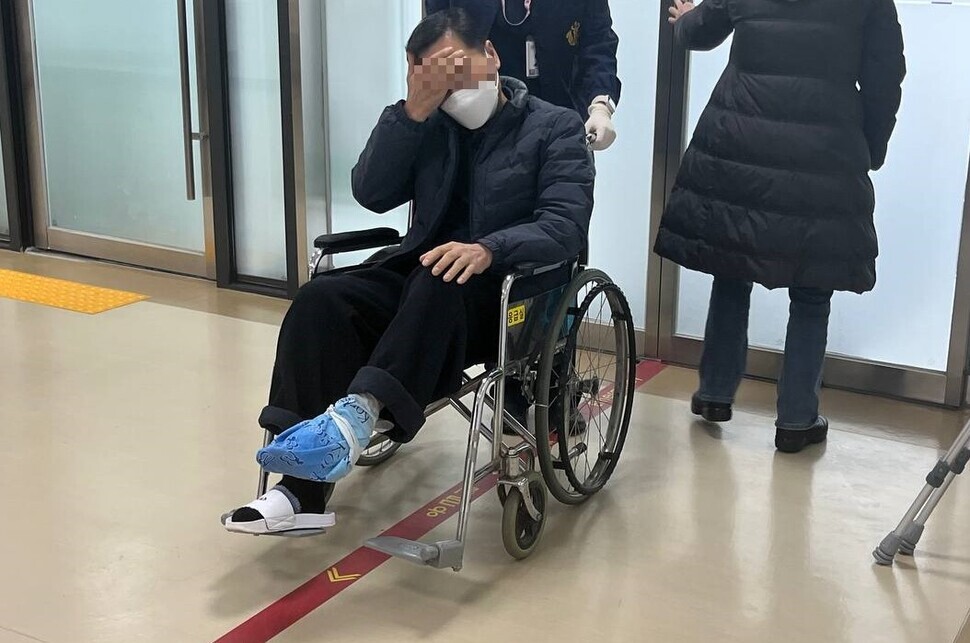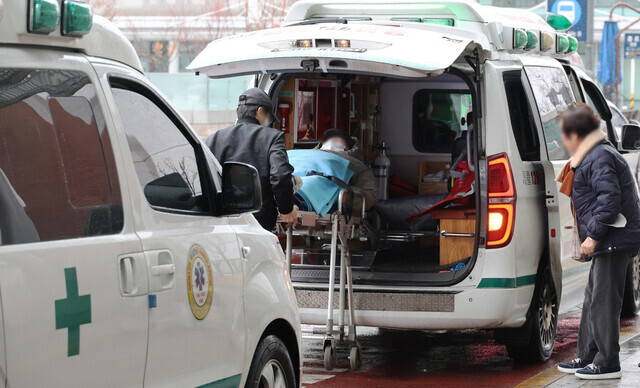hankyoreh
Links to other country sites 다른 나라 사이트 링크
‘No one to treat us’: Korean hospitals are dumping patients, forcing nurses to use PTO

“We were told that my husband had to be discharged since there weren’t enough doctors. But his wounds just wouldn’t heal at home, so that’s why we’re here.”
This is what a 59-year-old woman told the Hankyoreh after pushing her husband’s wheelchair into the Armed Forces Capital Hospital waiting room on Wednesday.
The woman’s husband had been diagnosed with chronic osteomyelitis, an inflammation of bone tissue, and had been receiving inpatient care after undergoing surgery at Korea University Guro Hospital. However, on Monday, his doctor advised that he be discharged, stating that the mass resignations of residents and interns had left the hospital with no one to treat patients.
Out of the five patients in the hospital room that the woman’s husband shared, all but one, who was in critical condition, were essentially discharged and kicked to the curb.
To fill the growing gaps in health care caused by the mass resignations of house staff at hospitals across the country as they protest the Yoon Suk-yeol administration’s plan to increase enrollment slots at medical schools, the government has extended the operating hours of public hospitals and opened military hospitals to the public.
Several patients who had been unable to receive treatment at university hospitals and other institutions turned to the Armed Forces Capital Hospital and the National Medical Center, located in Seoul’s Jung District. The Hankyoreh visited these two hospitals to speak to those most affected by the ongoing developments: patients and their caretakers.
A 56-year-old individual the Hankyoreh spoke to had been turned away from the Seoul National University Bundang Hospital’s emergency room and came to the Armed Forces Capital Hospital.
“My son broke his jaw the other day, so we needed him in the surgery room as fast as possible. We went to the emergency room, but they just immediately discharged him, saying that they didn’t have doctors to see him,” they said.
The information window next to the Armed Forces Capital Hospital’s waiting room had a sign that read, “We are out of office due to the treatment of civilian trauma patients.”
A woman in her 70s who visited the National Medical Center told the Hankyoreh that she had received a text message from Seoul National University Hospital saying that the hospital would need to postpone a neurological examination she had scheduled.
“They said I would have to wait an inordinate amount of time, so I came to get the examination at the National Medical Center,” the woman said.
As patients arrived at these two treatment centers, across town others were pouring out of Severance Hospital in Sinchon after being discharged.
“My son has a brain hemorrhage. He was going to go through rehabilitation at this hospital, but they told us that they don’t have rehabilitation specialists on hand now,” said a 64-year-old woman surnamed Kim, whose son was transferred to a local long-term care facility. “Each hospital room only has around one or two patients left in it.”

When the Hankyoreh visited Severance on Wednesday, four out of the 12 five-person rooms in the ward on the main hospital wing’s 11th floor were empty.
“The doctors said that we had no choice but to be discharged because of the mass resignations of physicians. We’ll be going to a hospital in Goyang that the doctors told us about,” another person caring for someone ill told the Hankyoreh’s reporter.
Meanwhile, some university hospitals have been forcing nurses to take days off due to the decline in patients in general wards. While physician assistant nurses and intensive care nurses are facing overbearing workloads in the wake of the resignations, their colleagues in general wards are under pressure to use their paid time off.
“Sunday and Monday weren’t my days off, but as the physicians’ collective action began in earnest, I was told to take a break. I didn’t come to work until Tuesday,” a nurse currently employed at Seoul St. Mary’s Hospital told the Hankyoreh.
Another nurse who works in a ward at Seoul National University Hospital corroborated that claim. “Since more than half of the patients who were in wards have been discharged, we’ve been forced into taking time off and to use up our PTO,” they said.
All the while, PA nurses are still tackling staff shortage problems. “In the surgery department, PAs don’t have night duties, but I heard that one PA has been set a schedule in which they’ll have to work night shifts for an entire month. Lack of staff is leading to unlawful practices,” a nurse working at a tertiary hospital in Seoul told the Hankyoreh.
By Kim Chae-woon, staff reporter; Kwan Jin-san, staff reporter; Jeong Bong-bi, staff reporter
Please direct questions or comments to [english@hani.co.kr]

Editorial・opinion
![[Column] Tariffs on China: Trump was dumb, Biden dumber [Column] Tariffs on China: Trump was dumb, Biden dumber](https://flexible.img.hani.co.kr/flexible/normal/500/300/imgdb/original/2024/0520/191716191153918.jpg) [Column] Tariffs on China: Trump was dumb, Biden dumber
[Column] Tariffs on China: Trump was dumb, Biden dumber![[Column] What if Seoul took reunification by force off the table? [Column] What if Seoul took reunification by force off the table?](https://flexible.img.hani.co.kr/flexible/normal/500/300/imgdb/original/2024/0520/3017161928630494.jpg) [Column] What if Seoul took reunification by force off the table?
[Column] What if Seoul took reunification by force off the table?- [Editorial] Intensifying US-China rivalry means Seoul must address uncertainty with Beijing sooner than later
- [Column] When ‘fairness’ means hate and violence
- [Editorial] Yoon must stop abusing authority to shield himself from investigation
- [Column] US troop withdrawal from Korea could be the Acheson Line all over
- [Column] How to win back readers who’ve turned to YouTube for news
- [Column] Welcome to the president’s pity party
- [Editorial] Korea must respond firmly to Japan’s attempt to usurp Line
- [Editorial] Transfers of prosecutors investigating Korea’s first lady send chilling message
Most viewed articles
- 1To weigh costs and benefits, Korea must stop treating US troop presence as a sacred cow
- 2Xi, Putin ‘oppose acts of military intimidation’ against N. Korea by US in joint statement
- 3Kim Jong-un wanted to meet with residents of shelled Yeonpyeong Island in South, Moon recalls in mem
- 4Berlin mayor hints at tearing down ‘comfort women’ memorial in city
- 5[Column] What if Seoul took reunification by force off the table?
- 6[Editorial] Transfers of prosecutors investigating Korea’s first lady send chilling message
- 7[Column] Tariffs on China: Trump was dumb, Biden dumber
- 8[Column] US troop withdrawal from Korea could be the Acheson Line all over
- 9[Column] In Germany, Japan is waging a war over its history with Korea
- 10AI is catching up with humans at a ‘shocking’ rate